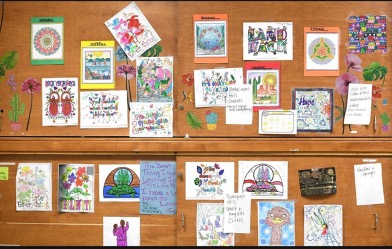Today is International Overdose Awareness Day, a day to raise awareness of and reduce the stigma of drug-related deaths. It’s important to recognize that women, trans and non-binary people who are unhoused and/or living in unsafe situations are impacted significantly by the drug poisoning epidemic across Canada. There is a need for gender-specific harm reduction services that recognize and respond to the intersection of substance use, gender-based violence and other forms of inequality that shape the lives of women, trans and non-binary people. This blog will discuss the Safer Drug Use Space, a new pilot program in Hamilton, Ontario, which was developed specifically for women, trans and non-binary people.
The YWCA Hamilton operates a transitional living program and overnight drop-in space for women, trans and non-binary people without children in their care. Over the past few years, the YWCA Hamilton has been responding to an increasing number of drug poisonings and overdoses across programs and has grieved many lives lost because of a toxic drug supply.
In direct response to the drug poisoning crisis in Hamilton, the YWCA Hamilton, Keeping Six and the Hamilton Social Medicine Response Team (HAMSMaRT) came together to develop and pilot a new program designed to support women, trans and non-binary people who use drugs and are without housing. In April 2022 they opened the Safer Drug Use Space in an existing overnight drop-in program and transitional living program operated at YWCA Hamilton.
The YWCA Hamilton partnered with Keeping Six (Hamilton Harm Reduction Action League), a community-based organization that defends the rights, dignity and humanity of people who use drugs led by people who use drugs. This partnership allowed for the development of a program that integrated peer workers. This program also incorporates the perspectives of people with lived/living experience(s) of homelessness and the needs of people who use drugs in Hamilton. The HAMSMaRT is a group of health care providers who believe that health is political and who aspire to remove barriers to clinical care. Through a partnership with HAMSMaRT, the Safer Drug Use Space has ongoing support from allied healthcare providers and an on-site Safer Supply Clinic.
The Safer Drug Use Space is operated through an exemption provided by Health Canada and the Office of Controlled Drugs and Substances, as an Urgent Public Health Needs Site (UPHNS). The Safer Use Drug Space operates every night from 10 p.m. to 9 a.m. Guests can bring their own illicit drugs into the space, get access to clean harm reduction equipment, consume substances (inject, ingest or snort) and be monitored for at least 20 minutes after consumption by both a YWCA Hamilton staff and a worker from Keeping Six.
It is common for individuals to stay longer than 20 minutes, to connect with staff and each other. Snacks are provided along with an opportunity to create art.
"The special thing about our safer use space that makes it stand out from others is that it's for women, trans and non-binary people exclusively and there's not a lot of that. I am proud to say that I am a part of this from the beginning. To be able to watch it grow and to connect and build relationships with other women from all walks of life in a space where everybody feels safe is such a privilege." - Danielle (Dani) Deloitinville (Keeping Six)
 Since opening its doors, the Safer Drug Use Space has connected many women, trans and non-binary people to a range of supports and services including:
Since opening its doors, the Safer Drug Use Space has connected many women, trans and non-binary people to a range of supports and services including:
- Crisis support following gender-based violence
- Emergency reproductive healthcare services
- Mental health services
- Gender-affirming healthcare services
It is so much more than just a safer space to use drugs - it is a point of connection for people who have been excluded from accessing other services and shelters because of their substance use.
In the first four months since opening, we have had 109 unique women and non-binary people access our space. We have supervised 1,071 injections and reversed 14 drug poisonings/overdoses. We have had 0 calls for EMS or police to our space.
We believe that Safer Drug Use Spaces are an important part of a low-barrier approach to supporting people experiencing homelessness in shelter services, housing programs and drop-ins. This approach to care saves lives and keeps people who use drugs safe and connected to services.
We encourage other organizations who are interested in learning more about how to integrate Safer Drug Use Spaces into their programs to reach out to Mary (Safer Use Space Coordinator/Community-Based Researcher) at vaccarm@mcmaster.ca.



